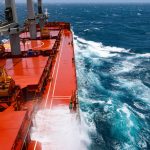Danelec, a leader in maritime digitalization and performance optimization, has collaborated with maritime technology intelligence firm Thetius to publish a pivotal new report, From Data to Action: Unlocking the Value of High-Frequency Data (HFD) to Enhance Safety and Achieve Ship Performance Goals.
The report, which will be published on January 29, explores the transformative impact of high-frequency data (HFD) on the maritime sector and offers recommendations on how best to apply it. It provides practical insight into transitioning from traditional noon reports to continuous, granular data streams, helping ship operators to optimize fuel consumption, and achieve decarbonization goals while meeting stringent regulations. These include the new FuelEU rules and EU MRV amendments, both of which came into force on January 1, 2025.
While recognizing that noon reports have long been the backbone of maritime operational reporting – with 70% of ships still reliant on them – the report will state that their limitations in light of digital advancements in recent years are today becoming apparent. The ‘Low Frequency Data’ (LFD) nature of noon reports lacks the immediacy needed to address evolving operational and environmental demands, whereas HFD unlocks actionable intelligence almost immediately. By offering real-time insights, HFD empowers operators to respond dynamically to changing conditions, optimize performance, and improve sustainability.
“The importance of real-time insights for operational efficiency must not be ignored,” said Casper Jensen, CEO, Danelec. “Shipowners and operators can make proactive decisions, reduce emissions, and increase profitability with a continuous HFD stream. With the massive advances in digitalisation and connectivity for globally sailing ships, this shift can now enable the maritime industry to meet ambitious decarbonization targets while fostering safety, efficiency and commercial success.”
“Our report represents a significant step in enabling maritime stakeholders to accelerate their digitalization journey while navigating the challenges of today’s regulatory and economic landscape,”
said Nick Chubb, Strategy Director of Thetius. “The research has delivered new insights that ship operators need to bridge the gap between traditional practices and a data-driven future where high-frequency data can realize the maritime industry’s ambitions for sustainability and efficiency.”
“The maritime industry is at a critical juncture,” added Jensen. “Embracing high-frequency data is more than an operational upgrade – it’s a paradigm shift that transforms decision-making, reduces environmental impact, and delivers value across the entire maritime ecosystem. The report provides actionable insights to guide the industry through this digital transformation.”
Underscoring the three primary drivers of HFD adoption – regulatory compliance, sustainability, and operational efficiency – the report also explores the impact of real-time data on applications including predictive maintenance, voyage planning and route optimization.
The report will officially be launched during a webinar hosted by Thetius on January 29, where industry experts will discuss key findings and recommendations, and the opportunities for maritime stakeholders to embrace HFD and digital innovation.
Source: Danelec




